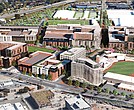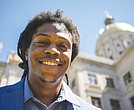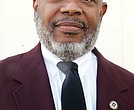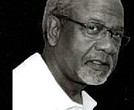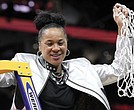Personality: Free F. Egunfemi
Spotlight on founder of Untold RVA
11/24/2016, 10:31 a.m.
Free Folasade Egunfemi is seeking to spread history throughout the Richmond community like seeds in a garden. Born in Englewood, N.J., and raised in Richmond, Ms. Egunfemi wants to offer residents, newcomers and tourists an opportunity to educate themselves about people and places of impact from bygone eras.
To do that, the 42-year-old is planting history stations and markers in neighborhoods, including Shockoe Bottom, Manchester, Church Hill and Jackson Ward, where people can stop and learn more, particularly about African-American history, through Untold RVA, which she leads and directs.
It is still a work in progress, but she brims with enthusiasm about the effort that she is largely funding herself. “Basically,” she says, “I’m going to different neighborhoods and setting up a portal or an installation of street art that includes photos and information about people from the area who made a difference. Then I create pods or places where those who are touring can stop, dial a number and hear a narrative about a specific area.”
The purpose, she says, is to remind people “that we stand on the shoulders of our ancestors and that this city is a place where people pushed back and accomplished so much. We need to remember those doers for whom there are no monuments.”
She is eager for people to learn about the resistance to the Confederacy in Richmond that involved enslaved people and white allies passing on intelligence to the Union Army. There are plenty of other stories that need telling, she says, about schoolteachers, business people and other “doers” who left their mark on the city.
She believes the success of her effort would increase understanding and insight about the past and the people who shaped it and would lead to a more hopeful future.
With help from students at Richmond’s Open High School, Ms. Egunfemi has set up her biggest installation to date on the African Burial Ground at 15th and Broad streets.
She has placed a history station and 15 markers, or stops, where people can use their cell phones for information about aspects of the burial ground, including Gabriel, the enslaved man who led a slave revolt in 1800 that was thwarted when information leaked out. He and several others were hanged at the site.
The burial ground, which was once used as a parking lot, is now a grassy field. It is said to have been a segregated municipal cemetery for enslaved and free black people between 1750 and 1816. The city now owns the property, a stop on the Richmond Slave Trail, as the result of a deal five years ago brokered by former Gov. Bob McDonnell with General Assembly approval and Virginia Commonwealth University.
Untold RVA also has set up a history station in the revived Hippodrome Theater in Jackson Ward and near the Southern States silos at 1 Manchester Road off Hull Street in South Side.
Ms. Egunfemi says she was smitten with history as a high school student. Instead of following a traditional path, she says she taught herself to be a historian by doing research and reading every book she could, particularly those focused on Richmond’s past, and then reading every book cited as a reference in each book’s bibliography.
Her passion for history has enabled her to find kindred spirits and create partnerships with others who are engaged in preserving, protecting or telling the stories of Richmond at area universities and in private organizations.
Her mission, she says, is to use Untold RVA and her knowledge to bring out the “missing pieces” within the city’s history that the Confederate monuments don’t tell.
Here is a close-up of this week’s Personality, Free Folasade Egunfemi:
Meaning of your name: Free Folasade Egunfemi. My first name means “self-determined.” My middle name means “wealth and honor is my crown” and my last name means “my ancestors love me,” all in the language of the Yoruba tribe in Nigeria.
Date and place of birth: Feb. 20, in Englewood, N.J.
Current residence: Swansboro in South Richmond.
Education: I’m self-educated. I read tons of obscure history books and focus on the bibliography sections in the back. Then I read all those books, too. I have taken courses through Virginia Commonwealth University and completed the Valentine Richmond History Center Tour Guide program at the University of Richmond. I also have taken classes that interested me at Virginia State University and J. Sargeant Reynolds Community College.
Family: Three daughters Pascale, Ari and Ngozi; my father, Bernard Scott; and my brother, Wise.
Untold RVA is: The people’s choice for the ethical presentation of the missing pieces within Richmond’s historical narrative.
I was motivated to create it because: The stories of Richmond’s self-determined ancestors weren’t being told in the way I thought they needed to be brought forth.
When founded: January 2014 at the Feast RVA Community Crowdfunded Startup Competition, which I won.
Its mission: Untold RVA is a home-grown, black-woman owned, urban exploration tour company that seeks to inspire people who come to the city in search of an alternative view of bygone eras.
How I became interested in history: In high school, I took an Advanced Placement European history class. I was smitten with history but the course’s focus frustrated me. I began studying black history and culture on my own. At 16, I ran unopposed for class historian, but lost when my honors English teacher unfairly wrote in someone else’s name on the ballot. I felt betrayed. I swore that I’d be a historian one day, no matter what. And that’s what I have become. I’ve made my own lane in this field. Now my life’s work is devoted to my history projects, which are an extension of my love for the ancestors combined with my fascination for my adopted hometown’s past.
Why it is important to learn history: We stand on the shoulders of our honored ancestors. Learning about their lives is a source of strength and inspiration. When we call out their names, we become empowered by their legacy. It is our responsibility to carry the narrative of their struggles and accomplishments, just as someone one day will carry these things for us.
Headquarters: Anywhere I feel like setting up to work that day. I have perch spots all over the city where folks let me set up my laptop and get on their Wi-Fi. Next year, I’m going to be the artist-in-residence at the new 6 Points Innovation Center in Highland Park. I am working with a partner to develop a dedicated space to produce history-inspired content.
Awards: 2008 Sacred Ground Reclamation Project Defender of the Year Award. I was just named a 2017 Community Trust Builders Fellow at Richmond Hill. Also the Vegan Iron Chef Award for my former VEGI <3 LUV street food kiosk.
Examples of places that are ignored: The city’s first slavery auction block along the canal in Manchester; the Shockoe Bottom tunnels that were part of The Underground Railroad; and the spot where Richmond’s first black cosmic spiritual healer’s shop used to be long ago. My favorite ignored place is Pocahontas Island in Petersburg. I found two Underground Railroad houses there and also wrote stories for RVA News about how my own ancestors lived there when it was a thriving free black community in the 1800s.
Examples of sites that are endangered: The best example is the African Burial Ground at 15th and Broad streets. It has been placed on Preservation Virginia’s Endangered Site List. I’ve devoted my attention to the care of this space. My mother’s ashes and the ashes of our dearest community elders have been placed here.
How I bring attention to UntoldRVA: Through my public art, social media posts, columns, podcasts and lectures. This summer I was featured in a PBS short film called “May It Be So” that debuted at the Afrikana Independent Film Festival in August.
What is the Self-Determination Tour: The citywide Self-Determination Tour lets you choose your own adventure using the network of Untold RVA’s history recordings or pods and street art installations. This guided tour is designed to reveal people and places that get little attention, such as the existence of an underground resistance movement that survived before and during the Civil War. You can hear the recordings by calling (804) 277-8116. At the prompt, press a number between 1 and 15 with the # at the end and a recording will begin.
What sites are included: I began by marking 15 spots on the African Burial Ground with audio captures featuring actual Richmond residents delivering selections from Untold RVA’s hidden history facts. Their words are spoken to the beat of experimental music produced by Rocstagis Frankincense Prince.
Other places that I am working on: Jackson Ward, Manchester and University of Richmond, then Oregon Hill and Church Hill.
How this effort is funded: Everything pretty much has been self-funded, with additional gifts to support specific projects from community partners like Feast RVA, Secretly Y’all, UnMonumental, the Ford Foundation and The MacArthur Foundation.
Richmond history currently is: Up for grabs. Other organizations currently are engaged in developing the black historical narrative. I’m working to make sure that the descendant community and its independent allies don’t get left out.
Untold RVA is needed because: It can help create jobs by training people to present Richmond’s self-determination stories in a new and inspiring way. The heritage tourism industry in Virginia generates about $7 billion annually from visitors. I want to generate income for people who would normally be overlooked by those who hire city tour guides.
Community interest in Untold RVA: I am a daily poster on social media. It’s the best way to inspire everyday people with the fascinating tales of Richmond’s hidden history. The Untold RVA Facebook page has 2,500 followers and the PBS film about my work has received nearly 50,000 views.
What more needs to be done: The tour is being expanded to include six more portals, or outdoor art, along Untold RVA’s Self-Determination Tour route. These portals are outdoor public art structures celebrating Richmond’s past. Audio for the pod markers will continue to be recorded and installed everywhere there’s an inspirational story to tell.
Interest from city: For the last two years, the city has been sending me busloads of touring scholars whose specific interest in our city’s black ancestral narratives led them to Untold RVA. Next year during Black History Month, Untold RVA’s new guides will be ready to help make the Self-Determination Tour even better. The tour also will be featured in the 2017 Visitors Guide from Richmond Region Tourism. A series of Untold RVA’s interactive pod marker ads also will be placed inside GRTC buses in 2017.
Interest from other history groups: Preservation Virginia recently retained me as an independent historical consultant to assess the current tour offerings at all five of their Richmond locations. The University of Richmond’s Race and Racism historical archive has invited me to host campus lectures and to install a portal and pod markers on their campus. I recently spoke at VCU’s conference on “Activating Black History through Digital Storytelling.”
What I would view as a success: To get my books written, to see all of my history projects come to fruition and to see my children and grandchildren achieving their destinies.
Best late-night snack: The fish shawarma platter from Shawarma Shack on Grace Street near VCU.
Quality I most admire in another person: Good character, which in Yoruba is known as Iwa Pele.
Biggest chance I ever took: Investing my inheritance in Untold RVA.
Nobody knows that I: Had my civil rights taken away from me at age 18, and they’re still gone.
Best thing my parents ever taught me: That there is no other option but to win. I was taught to remove any other outcome from my mind, then just go do the damn thing. This is my father’s core philosophy.
If I’ve learned one thing in life, it is: To ask for forgiveness instead of wasting a whole lot of time trying to ask for permission.
Books that influenced me the most: “Talk Stories” by Jamaica Kincaid and “Come August, Come Freedom: The Bellows, The Gallows and the Black General Gabriel” by Richmond’s own Gigi Amateau.
What I’m reading now: I’m currently reading nine different books and a ton of stuff online, but you guessed it, everything’s about Richmond back in the day.
Next goal: To get a grant to research a secret underground network of enslaved Richmonders and their white allies who helped people escape and resettle in Philadelphia. Also t o set up the Untold RVA offices in the new 6 Points Innovation Center and to get the tour guide training program underway.



